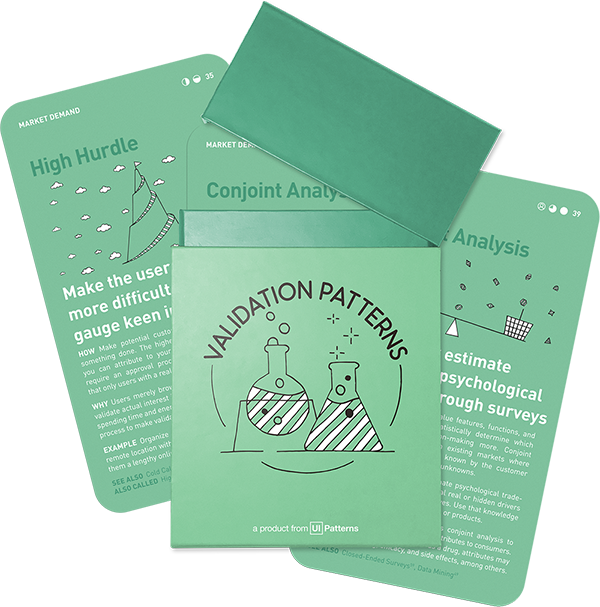Early decisions are better than later
Why early, frequent decisions beat perfect plans that drift into delay
Will your idea succeed? Find out with the Validation Patterns card deck
Run structured experiments to reduce risk and build what truly matters.
Get your deck!If there’s one thing that consistently slows down product teams, it’s indecision. Not bad code. Not weak design. Not even bad strategy. It’s the inability, or unwillingness, to decide.
“Decide Early, Decide Often”
A product manager’s most important job is not to collect data, host meetings, or polish roadmaps. It’s to make decisions. Early, often, and decisively.
The paradox of waiting: the last responsible moment
Mary and Tom Poppendieck introduced a concept that still feels counter-intuitive today: The Last Responsible Moment.
The idea is simple: delay making an irreversible decision until the last possible moment that still leaves your options open. Wait until you have enough information to choose wisely, but don’t wait so long that the choice is made for you by circumstance or inertia.
“If you jump too early, you lock yourself into a path with blind spots. If you wait too long, you don’t really decide at all—defaults creep in, and those defaults rarely reflect strategy.” – Jeff Atwood, Coding Horror
So yes, waiting can actually help you make better decisions. The trick is knowing when you’ve reached that “last responsible moment.”
But don’t confuse discipline with paralysis
The danger with this advice is obvious. Teams take it as permission to endlessly postpone, waiting for perfect clarity that never arrives. That’s a mistake.
Tristan Kromer makes the opposite point in Early Decisions Are Better Than Later: a rough, early decision beats a perfect decision made too late. Every decision creates data. Even a wrong decision gets you closer to what’s right.
The more decisions you make, the more you learn. Waiting for certainty is a recipe for stagnation. Progress comes from a steady cadence of decisions, not from a single perfect choice.
The role of boards (and why they shouldn’t decide)
One common slowdown is when decisions are outsourced upward. Innovation boards or executive committees try to play referee on every pivot, feature, or kill call.
The problem is distance. People removed from the daily reality of the team don’t have the context to decide well. Kromer argues in Don’t Make Decisions: boards should not be making choices for teams. Their role is to acknowledge the decisions teams have made, check that those decisions are grounded in evidence, and provide support.
If you’re in the product trenches, you should be the one calling the shots. No amount of external oversight compensates for the lack of on-the-ground knowledge.
Build a cadence of decision moments
One way to avoid both extremes, paralysis and recklessness, is to schedule decision points. Explicitly mark times where you’ll choose whether to pivot, persevere, or stop.
Kromer suggests framing these as recurring checkpoints: if the data is clear, act on it. If it isn’t, persevere and keep collecting. But don’t let the absence of clarity drag on forever. Indecision isn’t a strategy.
Having a rhythm of decisions keeps teams from drifting. It also normalizes the act of deciding. You don’t need to wait for a big crisis or a board review. You just need to keep moving forward.
Key takeaways
- Don’t rush irreversible choices. Use the Last Responsible Moment as a discipline to avoid premature lock-in.
- But don’t stall everything. A bad early decision teaches more than endless waiting.
- Decisions belong to the team closest to the work. Boards and managers should review and support, not decide.
- Set explicit decision points. Pivot, persevere, or stop. Don’t let choices drift.
Great product management isn’t about perfect foresight. It’s about momentum. The teams that win aren’t the ones who guess right every time. They’re the ones who decide, learn, and decide again.
Decide early. Decide often. And when it matters most, decide at the last responsible moment.
- The Last Responsible Moment by Jeff Atwood
- Advice to Innovation Boards: Don’t Make Decisions by Tristan Kromer
- Early Decisions Are Better Than Later by Tristan Kromer
